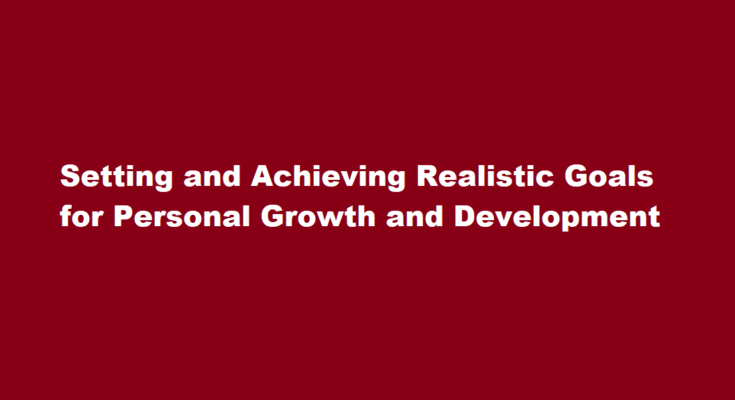Introduction
In the journey of life, personal growth and development serve as the guiding lights towards success and fulfilment. Setting and achieving realistic goals play a pivotal role in this process. However, the path to self-improvement is often riddled with challenges, and without a clear roadmap, individuals might find themselves lost in the abyss of unattainable dreams. This article explores the art of setting and achieving realistic goals for personal growth and development, providing valuable insights to help individuals pave their way towards success.
Clarity in Vision
The first step towards setting and achieving realistic goals is to gain clarity in your vision. Understand what you truly want to accomplish. This involves introspection and identifying your passions, strengths, and weaknesses. A vague goal like “becoming successful” is insufficient. Instead, break down success into specific aspects: career, health, relationships, and more. For instance, aiming for a specific job position or completing a marathon offers clearer objectives.
SMART Goal Framework
The SMART (Specific, Measurable, Achievable, Relevant, Time-bound) framework provides a structured approach to goal setting. A goal should be specific, leaving no room for ambiguity. Measurable goals allow you to track progress objectively. Ensure your goal is achievable by considering your resources and capabilities. Make sure the goal is relevant to your overall aspirations. Lastly, set a realistic timeframe for achieving the goal.
Break Down Goals
Large goals can be overwhelming. Breaking them down into smaller, manageable tasks makes the journey more feasible and less daunting. If your ultimate goal is to start a successful business, start by creating a business plan, conducting market research, and securing funding. Each of these becomes a separate goal that can be tackled individually.
Prioritise and Focus
With numerous aspirations, it’s easy to get lost in a sea of goals. Prioritise your objectives based on their significance and urgency. Trying to achieve too many things simultaneously can lead to burnout and frustration. Focus on one or a few goals at a time, giving them the attention they deserve.
Embrace Failure as Learning
Failure is an inevitable part of any journey, including personal growth. Rather than seeing failure as a setback, view it as a learning opportunity. Each misstep brings valuable lessons that contribute to your growth. Adjust your strategies and tactics based on these lessons to keep moving forward.
Constant Adaptation
Life is dynamic, and circumstances change. Be prepared to adapt your goals as needed. Sometimes, external factors may necessitate a shift in your plans. Flexibility in your approach doesn’t signify failure; it showcases your ability to respond to changing situations.
Stay Committed
Achieving meaningful goals demands consistent effort and commitment. Motivation may wane over time, but discipline keeps you on track. Create a routine that aligns with your goals, allocate time for specific tasks, and hold yourself accountable.
Seek Support
Personal growth doesn’t have to be a solitary journey. Seek support from friends, family, mentors, or coaches. Sharing your goals with others can provide accountability, motivation, and fresh perspectives. Constructive feedback helps refine your approach.
Celebrate Milestones
Don’t wait until you’ve achieved the ultimate goal to celebrate. Acknowledge and reward yourself for reaching milestones along the way. This boosts motivation and reinforces your belief in the attainability of the larger goal.
Practice Self-Care
The pursuit of goals should not come at the cost of your well-being. Incorporate self-care practices into your routine, such as exercise, meditation, and quality sleep. A healthy mind and body create a strong foundation for personal growth.
FREQUENTLY ASKED QUESTIONS
How can setting realistic and achievable goals build self confidence?
Setting goals for yourself will allow you to reach milestones in your life that will help you to feel more confident and inspired. When we reach goals, we are able to truly believe in ourselves which in turn helps us to boost our self-esteem.
Why is it important to set realistic goals?
It is important to set realistic goals and milestones as it increases motivation as each small win or realistic goal attained provides encouragement, confidence, and momentum to propel towards a loftier, larger, long-term goal.
Conclusion
Setting and achieving realistic goals is a transformative process that propels individuals towards personal growth and development. Through clarity of vision, strategic planning, perseverance, and a willingness to adapt, anyone can navigate the path to success. The journey might be challenging, but the rewards are immeasurable—greater self-awareness, enhanced skills, and a heightened sense of accomplishment.
Read Also : Nurturing Endurance Unveiling the Path to Sustained Motivation and Inspiration



